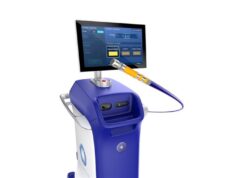Medtronic has announced that its investigational OmniaSecure defibrillation lead met its primary safety and effectiveness endpoints, exceeding prespecified performance goals in the global LEADR pivotal trial.
Results of the prospective, multicentre, single-arm, non-randomised, global clinical trial were presented at the Heart Rhythm Society (HRS) annual meeting (16–19 May, Boston, USA).
The study assessed the safety and effectiveness of the OmniaSecure defibrillation lead when placed at traditional locations in the right ventricle to achieve defibrillation, sensing, pacing and cardioversion in patients at risk of sudden cardiac death. The study enrolled 675 patients at 45 sites in 17 countries in North America, Europe, Asia, and Australia.
Implantable cardioverter defibrillators (ICDs) are the gold standard for preventing sudden cardiac death. Yet transvenous defibrillator leads remain the weakest point of the system. Existing defibrillation leads have a large diameter (7-8 Fr), which can contribute to venous occlusion or tricuspid valve complications.
For patients where an extravascular defibrillator may not be appropriate, Medtronic engineers designed the OmniaSecure defibrillation lead based on the Medtronic SelectSecure model 3830 pacing lead.
The LEADR trial showed that defibrillation testing conducted at device implantation in 119 patients was successful in 97.5% of cases using Omniasecure, exceeding the prespecified efficacy goal of 88%.
At six months, 97.1% (Kaplan-Meier estimate) of 657 patients with an implant attempt were free from lead-related major complications such as hospitalisation, lead fracture, system revision, or death. The study exceeded the prespecified safety performance goal of 90%. There were no lead-related major complications observed between six and 12 months (average follow up of 12.7±4.8 months).
“The positive results from the LEADR pivotal trial are a significant advancement for patients at risk of sudden cardiac death who rely on ICDs to deliver life-saving therapy in the event of a dangerous heart rhythm,” said George H Crossley (Vanderbilt University Medical Center, Nashville, USA), LEADR pivotal trial steering committee chair. “Patients with defibrillators are living longer today, and we need to strive for reliable therapy for the lifetime of the patient. This innovative, low-profile defibrillation lead leverages a highly reliable pacing lead design to help achieve this goal, and the unique catheter-based method of implantation helps the physician place the lead in the optimal position for the patient.”
The OmniaSecure defibrillation lead is investigational and not yet approved for sale or distribution.









